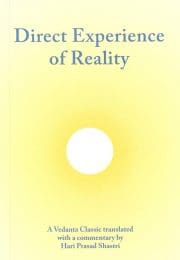Direct Experience of Reality
The Direct Experience of Reality contains 100 verses from a classic text on non-duality, translated with a commentary by Hari Prasad Shastri.
The text covers the essential points in the non-dual teachings. It begins with the qualities needed to pursue the path to illumination. It explains that our difficulties come from not knowing our true Self and the erroneous belief that we are something we are not. Then it explains how to overcome these distortions and discover our true nature, the direct experience of reality.
Points in the teachings which are considered in detail elsewhere are expressed in this text with particular succinctness and clarity. It suggests that we trust that the teacher and the classic texts are reliable guides who can really help us. If we do this, we can direct our thoughts positively in line with the non-dual teachings and make secure progress.
Here are some verses from the first part of the text:
Devoted trust (bhakti) in the words of the holy scriptures and the teacher is called faith (shraddha); one-pointedness of the mind on the one real goal of life is called concentration (samadhana). [8]
One who is endowed with the disciplinary qualities mentioned above and is devoted to the highest good ought to exercise his faculty of reflection and ratiocination to achieve the knowledge of truth. [10]
“I am not the body, which is a combination of material elements, nor am I a collection of the senses. I am something different from both these.” This is the reasoning called cogitation (vichara). [13]
“It is a most undoubted fact that I am the One who is subtle, the cognizer, the witness, truth and imperishable”. This is the reasoning called cogitation (vichara). [16]
Notwithstanding its directness, the text is philosophically rigorous. It deals incisively with the question of whether ‘karma’ continues after the rise of true knowledge. It also provides a clear metaphysical explanation of what is really meant by the ‘stages’ of Yoga.
In the original Sanksrit, this text is called Aparokshanubhuti, meaning something like ‘unmeditated intuition’, or ‘direct experience of reality’, that is, knowing that is not dependent on the workings of the mind. It is traditionally attributed to Shri Shankara himself, although some scholars now suggest that it is by a close follower. Either way, it is a reliable account of the essential teachings. The commentary by Hari Prasad Shastri enlarges on its relevance for us now.
This is a good book to study carefully. It will help us to understand why, at the time of meditation, we put aside discursive thought and absorb ourselves in what is indicated in the meditation text. It will also help us to keep what really matters in the back of the mind, whatever we are doing throughout the day.


